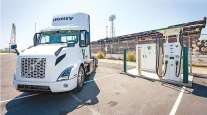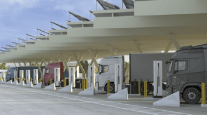Staff Reporter
FHWA Grants Will Support User Fee Projects in States

The Federal Highway Administration has awarded over $10 million to states that are testing alternative methods to fund highway and bridge projects.
FHWA announced Feb. 12 that seven states would receive Surface Transportation System Funding Alternatives grants. Created through the Fixing America’s Surface Transportation Act of 2015, the grant program supports states that are exploring user-based revenue mechanisms.
FHWA selected proposals from seven states — California, Delaware, Minnesota, Missouri, New Hampshire, Oregon and Utah. The projects will evaluate miles-based user fees (MBUF) and road user charges.

Hendrickson
“These grants provide states with the opportunity to explore innovative new ways to help pay for infrastructure improvements and maintenance,” Deputy Federal Highway Administrator Brandye Hendrickson said in an agency press release.
The Delaware Department of Transportation and the I-95 Corridor Coalition together received over $3 million, the largest of the grants. The funds will provide continued support for the partners’ MBUF program. Patricia Hendren, executive director of the I-95 Corridor Coalition, said this funding will help expand the program, which originated in Delaware and Pennsylvania and has expanded through partnerships in North Carolina, New Jersey and Virginia.
Phase 1 of the program, which took place in Spring 2018, included a pilot test of an MBUF with more than 155 participants, including DOT officials, legislators and other stakeholders along the East Coast. Hendren said that the East Coast is an important testing ground because it is home to many toll facilities and frequent interstate freight traffic.
Phase 2, which started in October, is a multistate truck pilot to explore if current regulations and technology can serve as a framework for MBUF. The truck pilot includes 59 trucks from four motor carriers.
More than $10M in STSFA grants will give states the opportunity to look at new ways to finance highway improvements. https://t.co/rCXN4cXYJ1 — Federal Highway Admn (@USDOTFHWA) February 14, 2019
Hendren said Phase 1 helped participants develop a better awareness about how much they pay in fuel taxes to maintain roads. After receiving the invoice of the estimated amount of state fuel tax they had paid, 31% of pilot participants thought they actually paid more in state fuel taxes.
“I think that’s really important as we’re having this conversation with the public,” Hendren said. “By having this open dialogue about how our transportation system is funded, we are putting a big spotlight on those taxes. We need to understand how people react to that and, so far, the reaction is surprise.”
The MBUF system requires technology to tabulate how far a vehicle has traveled, information that helps determine how much a vehicle is charged. However, this type of technology can raise concerns over privacy and security, issues that are important to Utah DOT. The state received over $1 million to support administrative costs to launch a road user charge (RUC) program for electric and hybrid vehicles, a user fee based on the number of miles people drive rather than the gallons of fuel their vehicles consume.
Eileen Barron, spokeswoman for the U.S. Department of Transportation’s Planning and Investments Division, explained that electric and hybrid vehicle owners currently pay an annual flat fee in lieu of a fuel tax. In 2020, the department will give these vehicle owners the option of enrolling in the RUC program or paying the flat fee. She noted that the RUC will be capped to match the annual fee, so people who voluntarily enroll won’t pay more than what they would’ve paid with the flat fee.
“That’s another reason why we’re choosing to make this program optional at this point, so that if people have privacy concerns, they can pay the flat fee,” Barron said. “That’s something, as we go into this program, we’ll be watching closely to get a better understanding of what our users’ interests and concerns are.”
I-95 Coalition and DelDOT Receive A Third STSFA Grant https://t.co/dQuwHb0Y1r — DelDOT (@DelawareDOT) February 19, 2019
Many states are pursuing infrastructure funding mechanisms to counterbalance the flagging federal Highway Trust Fund, which helps states with construction and maintenance projects and relies heavily on the federal fuel tax.
The federal fuel tax has stagnated at 24.4 cents a gallon for diesel and 18.4 cents a gallon for gasoline since 1993. Improvements in fuel consumption and shifting driving habits contribute to the account’s steady decline, prompting several general fund transfers in recent years to maintain its solvency.
“Everyone sees the long-term direction of transportation funding is going down,” Hendren said. “It will go down with the changing fleets, with increased miles per gallon [and] with fuel efficiency, which is great for our personal pockets and the environment. But if our transportation system is dependent on that fuel tax, we have to look long term and think, ‘What are we going to do?’ ”




